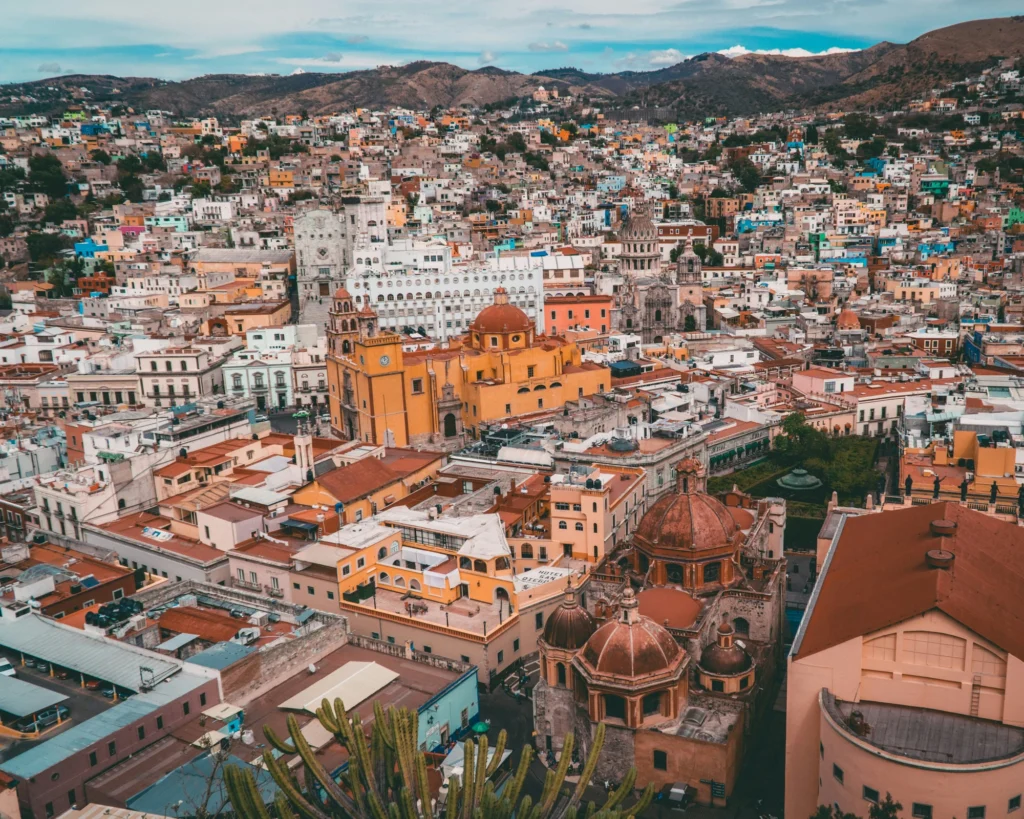Uncle Sam isn’t just making it hard to retire comfortably. He’s making it expensive and difficult. But what if moving overseas could cut or even eliminate your tax bill?
Good news – It can!
Welcome to international living, a reality most Americans never even realize exists. If you live abroad, there are legal ways to reduce your tax liability and take back more of the income you’ve worked hard to earn.
We’ve covered the foreign earned income exclusion. But in this guide, you’ll learn where to move abroad to reduce your expat taxes and live a higher quality of life on the same income as you earn now.
Below are five countries that make this lifestyle shockingly easy – with residency options designed for Americans and friendly tax treatment on foreign income.
Or watch the video here instead:
5. Mexico

For American expats, Mexico is one of the most accessible relocation options on Earth.
Why?
- Direct flights from major US cities
- Similar timezones as America’s
- World-class healthcare at a fraction of US costs
- One of the largest foreign retiree communities in the world
Mexico ticks every box when it comes to quality of life, yes. But from a tax perspective, here’s what you need to know:
Taxes are really only a consideration in Mexico if you spend more than 183 days in the country per calendar year. Only then are you legally considered a Mexican tax resident. Usually that also means filing tax returns and possibly paying income tax to the Mexican government.
Although Mexican tax rates are not friendly, the government does have a double taxation agreement with the United States. So, even if you’re taxed in both countries, you won’t pay tax twice on the same income, thanks to the treaty.
With proper structuring, most expats can reduce or eliminate at least one side of that bill – especially if they keep ties to a zero-state tax US state or remain under the tax residency threshold. (Remember the foreign earned income exclusion in this calculation!)
How to Move to Mexico
We’ve detailed how to move to Mexico in-depth in our deep-dive guide (Read: “How Do I Move to Mexico?”) and on the Retire to Mexico page. But here’s a rough summary:
Mexico’s Temporary Residency Visa is one of the most flexible programs in the world. You can qualify for immediate residency with either proof of US$4,000 per month in income over six months or US$75,000 in savings over a twelve-month period. There’s no language requirement, no employment obligation, and it leads to permanent residency in just four years with no physical presence.
After five total years in the country (or just two if you marry a Mexican citizen), you can apply for Mexican citizenship. And yes – dual citizenship is allowed. And, to many Americans’ surprise, the Mexican passport is strong – top 15 globally in some rankings.
4. Greece

Most people dream of vacationing in Greece for the history, beaches, and food. But imagine retiring there and waking up every day to the Mediterranean lifestyle.
There’s another small detail few know about Greece that should make it extremely attractive, especially for retired expats: Under this little-known program, new residents in Greece can qualify for a flat 7% tax rate on all foreign retirement income – including pensions, Social Security, dividends, and more – for 15 years.
That’s not a typo. 7%. For 15 years. No matter how much your income grows.
How to Move to Greece
Obviously, in order to take advantage of this Greek tax regime, you must move to Greece.
Residency options include the Financially Independent Person (FIP) Visa and the Greek Golden Visa. The former program is designed specifically for retirees and requires around €2,200 per applicant per month in passive income – no business creation or investment needed.
The latter program is designed for high-net-worth individuals, real estate investors, and others who want to live in Greece with flexibility. Under the Golden Visa program, you must meet one of the following requirements:
- Invest €250,000 in a qualifying Greek startup
- Invest €250,000 in renovating or converting a commercial property to residential
- Invest €400,000 in real estate in less densely populated areas
- Invest €800,000 in real estate in more densely populated areas (e.g. Athens, Santorini)
This is one of the lowest thresholds across EU residency programs.
Although the citizenship pathway is uphill, one can obtain a powerful Greek passport in as little as seven years.
3. Paraguay

Paraguay is a relatively discreet tax haven in Latin America. While it’s not as flashy as its neighbors, it’s one of the world’s most pro-expat destinations if you’re looking for low costs, privacy, and zero tax on foreign income.
Paraguay operates on a territorial tax system, meaning you only pay taxes on income earned inside Paraguay. Everything else – US-sourced Social Security, foreign investments, pensions, and online business income – is completely exempt from taxes in Paraguay.
Even if you do start a business in Paraguay or make money in the country, income taxes are still extremely low compared to what one might pay in most European countries and the United States.
How to Move to Paraguay
Paraguayan temporary residency is also one of the simplest processes in the Americas. All you need is a valid passport, proof you can support yourself, and a few notarized documents. Permanent residency is typically granted within three years of temporary residency – and it’s not contingent on income or property investment or even physical presence in the country.
On the other hand, Paraguay does not officially allow dual citizenship. But because enforcement is lax, many expats successfully hold a Paraguayan passport, as well as their prior one.
2. Panama

If you’ve researched retiring abroad, Panama has probably already popped up. It’s no coincidence.
With a territorial tax system (meaning they only tax income generated in their own country), a US dollar economy, and some of the best infrastructure in Central America, Panama is often called the “Miami of Latin America” – only with lower taxes and better coffee.
How to Move to Panama
Panama’s Pensionado Visa is arguably the best retirement visa in the world. All you need to qualify for immediate permanent residency in the country is a US$1,000 monthly income. As a retiree in Panama, you even have access to special discounts on healthcare, entertainment, restaurants, and more.
Not yet retired? Panama’s Friendly Nations Visa allows permanent residency via a local business formation; US$200,000 investment in local real estate; or a US$200,000 local bank account deposit.
With many hospitals affiliated with Johns Hopkins and the Cleveland Clinic and employing US-educated doctors, healthcare in Panama City rivals US standards and often costs 20-50% less.
If you’re looking for zero taxes, a direct flight to numerous American cities, and a modern cosmopolitan environment, Panama checks every box.
1. Italy

Italy surprises most people.
Long known for red tape and sky-high taxes, Italy offers one of the most generous tax incentives in Europe for foreign retirees and expats.
Italy’s flat tax regime allows new foreign residents to pay just 7% on all foreign income – including dividends, pensions, capital gains, and business profits – for a full decade.
To qualify, you must move to Italy, not have been a tax resident of Italy in the past five years, and file for the special tax regime within the first year of your residency.
So of course, that brings up the question – How do I move to Italy?
How to Move to Italy
Italy’s Elective Residency Visa allows foreign retirees and financially independent people to move to the Southern European country without the desire to work. Requirements include accommodation in Italy and proof of about €3,000 per applicant per month in income.
Italy also offers a competitive Golden Visa program, starting at investments of €250,000.
If your goal is citizenship, know that dual citizenship is allowed. If you have Italian citizenship, you may even qualify for Citizenship by Descent. Otherwise, it may take ten years of residency to be eligible for naturalization (parliament is currently discussing a reduction to five years of residency).
Once you have an Italian passport, you have the right to live, work, study, and access healthcare in any EU country.
Final Thoughts on Expat Taxes
Choosing to live abroad isn’t just about adventure, purpose, and freedom. It’s about strategy too. By choosing a country with the right tax structure and planning your relocation carefully, you can legally reduce or eliminate your expat taxes while enjoying a higher quality of life overseas.
Territorial tax systems, flat tax regimes, double tax treaties, residency programs tailored to expats – Internationalization topics can sound complicated. But that’s why hundreds of expats trust the Freedom Files.
If you’re ready to explore your options, we can help. Book a Freedom Consult or download our free 162-page guide on how to retire earlier and live better abroad.


